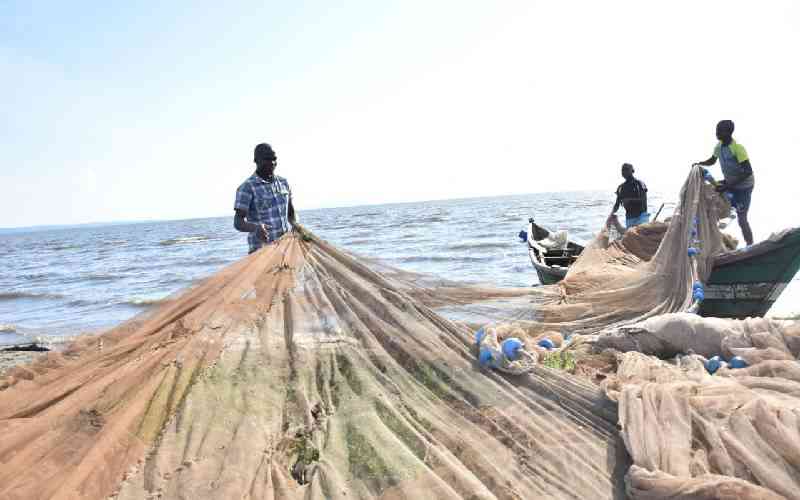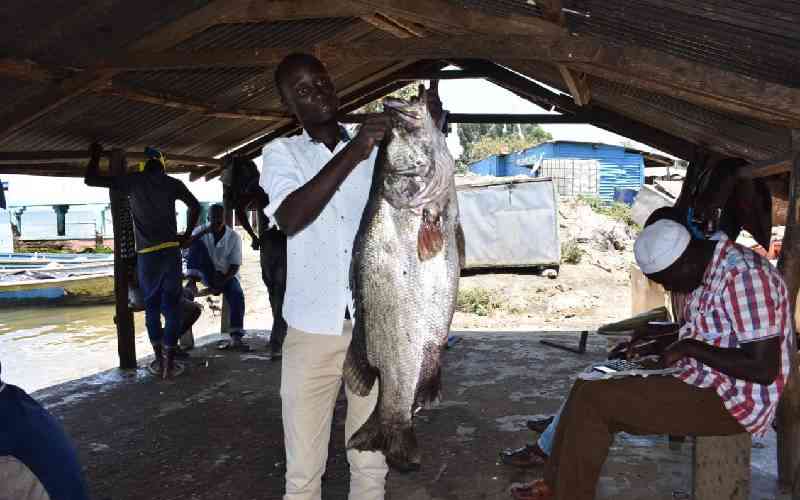
A group of women sit patiently at Nyamware beach in Nyando, Kisumu County as two boats appear from the horizon.
Their silence is briefly disrupted by a hippo as it raises its head from a patch of floating water hyacinth weed and snorts loudly before disappearing again.
As the boats moves closer, the women begin to prepare to collect the day's catch. They scramble for the boats, each carrying a basket and all hoping to get fish they can sell to the market.
However, as the four fishermen aboard begin to unfurl their nets, gloom replaces the hope that had been written on the women's faces.
A glance inside the boats indicate that only a handful of mudfish and Nile perch had been caught by the fishermen. To be specific, they had caught just five tilapias despite spending more than 12 hours in the deep waters of Lake Victoria in a daily fishing expedition exercise that starts around 5 p.m and ends at 6 a.m the following day.
"This is all we got," says David Owino, one of the fishermen.
Within minutes, the fishermen have already sold all the fish to the women but keeps one tilapia for themselves. A few of the women who had hoped to get a share walks away to a shade in disappointment.
Some of the fish mongers sell only dagaa while others sell haplochromine fish species, locally known as Fulu, a local delicacy among the Luo community.
Fishermen and fish mongers told The Standard that the situation at the beach is just an example of what is happening across the region as fish stocks decline and some species disappear.
They claim that some fish species which were dominant in the region have dwindled in numbers and have become very rare to catch.
Maurine Auko, says she has been selling 'fulu' for more than ten years and it has become so difficult to find the delicacy pushing her to sell other species.
"There are days we come here with the hope of finding fish but we end up with nothing. There are days the boats return to the shores empty," she explains.
Interviews at the beach as well as spot checks in other beaches including Dunga, Asembo and Rakwaro established that fishermen no longer catch some species of fish that were dominant for several decades.
At Rakwaro beach, Joash Okello, a 60-year-old fisherman said that unlike the past where they would catch a variety of fish, the situation has changed.
"Nowadays it is even a miracle to catch tilapia. We do catch only a handful and we cannot make any profit from them," he said.

According to Okello, Tilapia and 'fulu' species like clean water. He blames pollution of the lake caused by soil erosion as well as human activity for the decline of the species.
According to scientists, the decline is attributed to climate change as well as invasion by invasive species like Nile Perch.
Christopher Aura, a researcher at Kenya Marine and Fisheries Institute said in 1950's, there were about 500 species of haplochromine fish. The numbers have now declined to about 200.
About two months ago, piles of fish washed up the shores of several beaches in Nyanza region with scientists attributing it to depleted oxygen in the lake.
They said development on massive pollution and rotting water hyacinths as well as changes to the environment caused by climate change is another contributor to the deaths.
Nyanza regional coordinator Fisheries, aquaculture and blue Economy Samson Kidera said the current fish deaths being witnessed in the Gulf, both in the natural waters and in the cages are a result of suffocation due to the upwelling in the lake.
"Our findings reveal that the oxygen level in the water has gone down and mainly fluctuates between four and two concentrations which are below the level that can support life," said Kidera.
The situation has been worsened by the increase of the number of fishermen seeking to eke a living from fishing. Some of them have adopted negative fishing practices such as trawling which depletes young fish.
According to a recent report by Lake Victoria's Fisheries Organization(LVFO) the number of fishermen has increased from 50,000 using about 12,000 fishing boats in the 1970s to over 200,000 with 60,000 boats in 2015.
In Homa Bay, rogue fishermen have adopted a destructive method known as 'Abunglu' which involves the use of nets designed to be towed by a boat through the water.
In the process, the fishermen use a tool made of a jerrican and a wooden handle to hit the water. This leads to the production of sound which scares fish. As the fish try to escape the scary sound, they get trapped in the net.
This method catches fish of all sizes including young fish which should grow and reproduce.
The chairman of beach management units in Suba Sub-county William Onditi expressed concerns that this method will likely cause an unprecedented shortage of fish in Lake Victoria if it is not stopped.
"Abunglu leads to catching of both mature and immature fish. Catching young fish means no fish will be left to multiply in future. This will deplete fish in the lake," said Onditi.
 The Standard Group Plc is a multi-media organization with investments in media
platforms spanning newspaper print
operations, television, radio broadcasting, digital and online services. The
Standard Group is recognized as a
leading multi-media house in Kenya with a key influence in matters of national
and international interest.
The Standard Group Plc is a multi-media organization with investments in media
platforms spanning newspaper print
operations, television, radio broadcasting, digital and online services. The
Standard Group is recognized as a
leading multi-media house in Kenya with a key influence in matters of national
and international interest.

